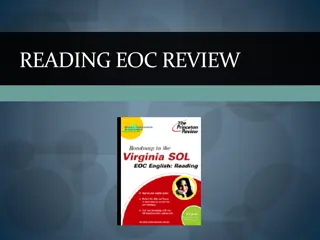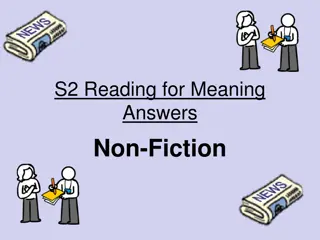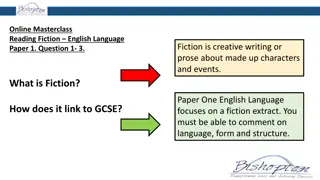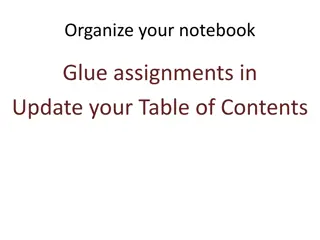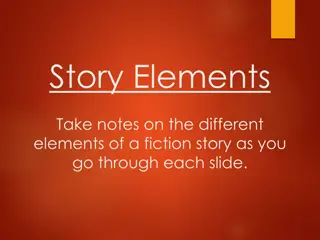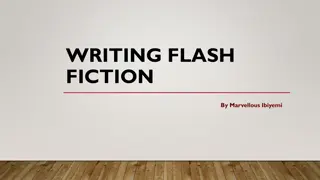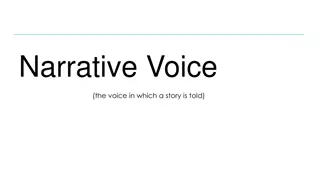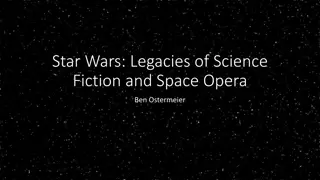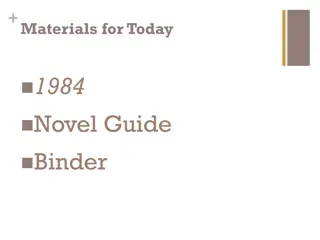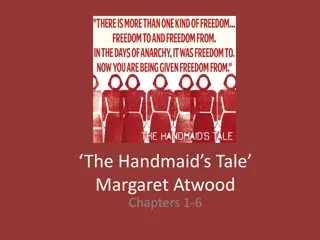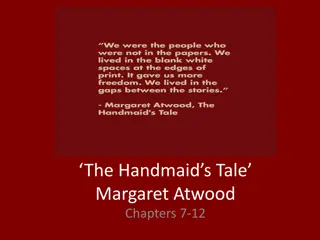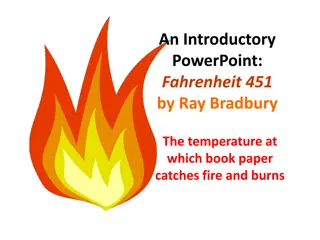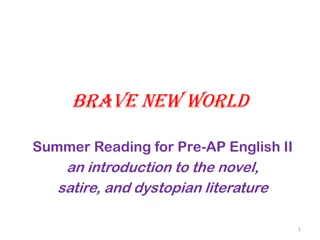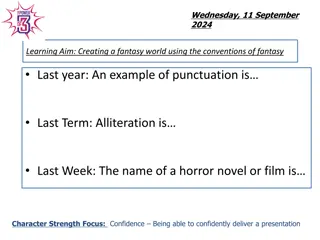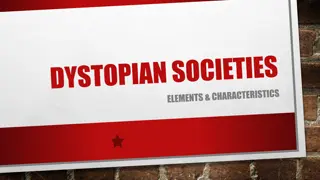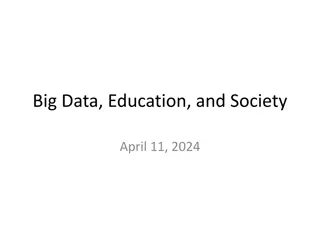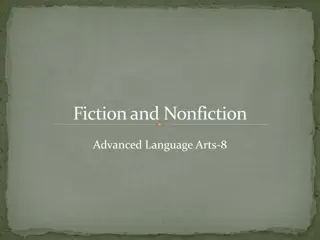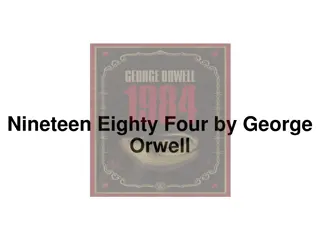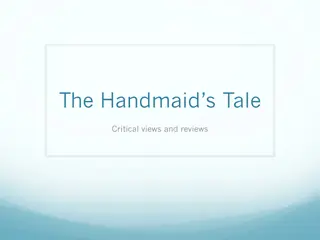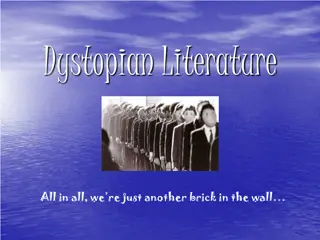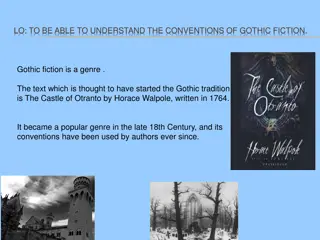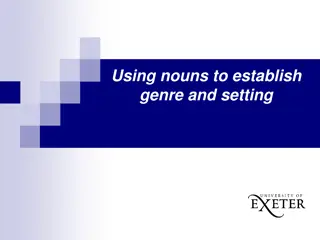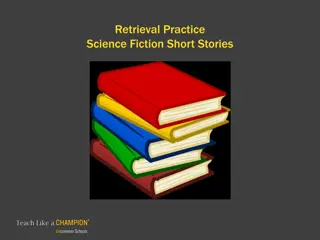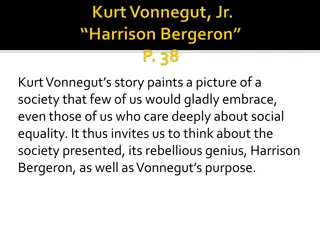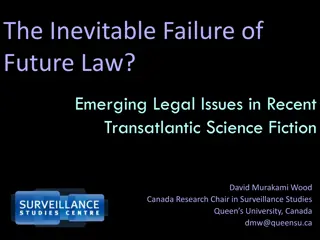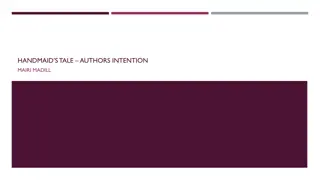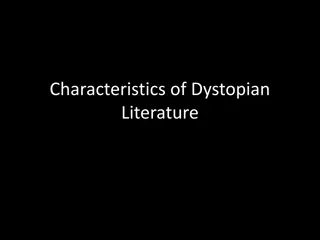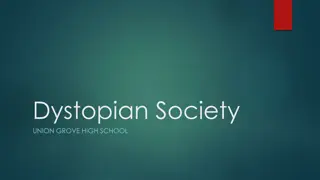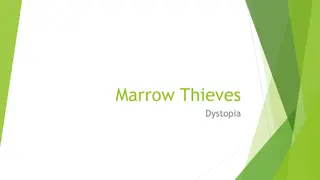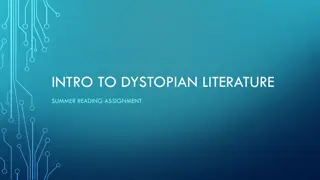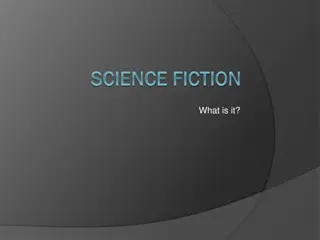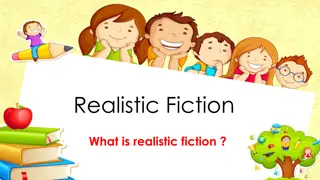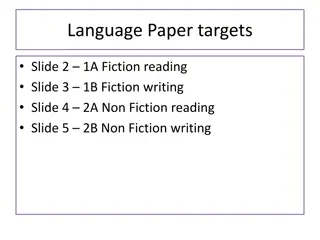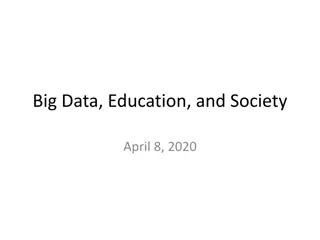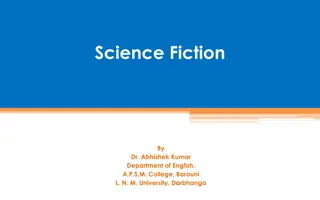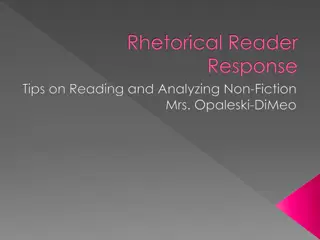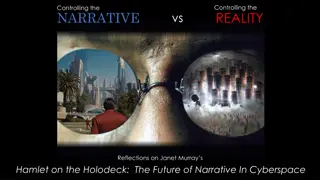Exploring Citizen Journalism and Non-Fiction Writing
Explore the world of citizen journalism and non-fiction writing, learning about text types, adapting writing to conventions, considering audience, purpose, and tone. Discover the significance and usefulness of non-fiction writing, and delve into creating various text types. Uncover the role of citiz
1 views • 11 slides
Reading EOC Review: Test Structure, Types of Selections, and Breakdown
The Reading EOC Review covers the test makeup, types of reading selections, and breakdown of questions and content to help you prepare effectively. The test comprises sections with 55 scored questions to be answered, focusing on functional literacy and narrative/fiction elements, including poetry, p
8 views • 26 slides
Exploring Contemporary Non-Fiction Themes
Delve into diverse non-fiction topics such as pet pampering, societal contradictions in teen reading habits, environmental concerns like plastic pollution, and societal opinions on education and lifestyle choices. Discover intriguing discussions and thought-provoking insights in this engaging collec
0 views • 55 slides
Understanding Fiction Through Text Analysis: Paper 1 English Language Masterclass
Delve into the world of fiction through an analysis of the novel "Girl With a Pearl Earring". Explore how language, form, and structure are used in the extract to captivate readers. Discover the characters, setting, and narrative techniques employed by the writer to engage and intrigue readers. Unco
2 views • 7 slides
Exploring Historical Fiction: Elements and Examples
Discover the essence of historical fiction, its key elements, and examples like "Forrest Gump." Learn how plausibility and interpretation play pivotal roles in creating captivating narratives that blend fiction with historical events.
0 views • 11 slides
Spring 2015 English 110 Final Exam Information
Spring 2015 English 110 Final Exam includes an Essay Final Exam to be completed by May 21st and an Objective Final Exam on May 27th or May 28th. The Essay Final consists of flash fiction tasks, literary criticisms, and analysis, while the Objective Final covers fiction elements identification and an
0 views • 7 slides
Essential Elements of Fiction Storytelling
Dive into the key components that make up a compelling fiction story, including plot development, setting, mood creation, character conflicts, and the use of imagery and dialogue to enhance the reader's experience. Explore these foundational elements to enhance your storytelling skills.
1 views • 36 slides
Crafting Compelling Flash Fiction: Techniques and Examples
Dive into the world of flash fiction with this informative piece detailing the essence, types, and techniques of writing succinct yet gripping stories. Learn how to hook readers from the start, use impactful scenes over summaries, and create lasting impressions with minimal words.
0 views • 18 slides
Understanding Narrative Voice in Fiction Writing
Explore the elements of narrative voice in fiction writing, including tense, perspective, and language choices. Learn how authors decide on the tense and perspective for their stories, and consider different language styles that suit various characters and perspectives. Discover the nuances of first
1 views • 7 slides
Influential Works in Science Fiction and Space Opera Literature
Explore the significant influence of classic science fiction novels like "War of the Worlds," "A Fighting Man of Mars," "Second Foundation," "2001: A Space Odyssey," and "Children of Dune" on the creation of iconic space opera narratives such as Star Wars. Delve into the themes, settings, and charac
0 views • 16 slides
Understanding Dystopian Societies in 1984 Novel Guide
Explore the themes of utopia and dystopia in George Orwell's 1984 novel through a comprehensive guide. Learn about the characteristics of dystopian societies, types of controls, and the role of protagonists in challenging oppressive systems. Dive into the discussions on propaganda, surveillance, deh
0 views • 10 slides
Insights into "The Handmaid's Tale" Chapters 1-6 Analysis
Within the first six chapters of "The Handmaid's Tale" by Margaret Atwood, we are introduced to the narrator, Offred, and gain a detailed understanding of the life and role of a Handmaid in the dystopian society of Gilead. Key quotes and epigraphs shed light on the themes of fertility, desperation,
0 views • 20 slides
Understanding Offred's Journey in "The Handmaid's Tale" through Chapters 7-12
Offred's experiences in chapters 7-12 of "The Handmaid's Tale" reveal the depth of her depersonalization and loss of identity in the dystopian society of Gilead. Through key quotes, we delve into Offred's reflections on her body and the control imposed upon her, shedding light on her feelings toward
0 views • 12 slides
Insights into Fahrenheit 451 by Ray Bradbury
Explore the influential novel Fahrenheit 451 by Ray Bradbury, delving into its origins, themes, and relevance in the context of societal criticism, dystopian elements, and historical backdrop of the 1950s. Discover the cautionary tale of censorship, technological advancements, and the impact of tota
0 views • 16 slides
Exploring "Brave New World": An Introduction to Dystopian Satire
This guide provides an overview of Aldous Huxley's "Brave New World," discussing its themes of propaganda, censorship, conformity, genetic engineering, and social conditioning. Delve into the novel's depiction of a controlled society, the use of technology, consumerism, and the satire employed to cr
1 views • 15 slides
Exploring Fantasy Worlds: Conventions, Types, and Challenges
Dive into the realm of fantasy literature and learn about the conventions, types, and differences between fantasy and sci-fi. Uncover the definition of fantasy, explore popular genres, and discover sub-genres like fiction, science fiction, and historical fiction. Engage in thought-provoking challeng
0 views • 17 slides
Washington Irving: Father of American Fiction and Pioneer of American Romanticism
Washington Irving, an influential American author of the early 19th century, is revered as the Father of American fiction. Known for iconic works like "The Legend of Sleepy Hollow" and "Rip Van Winkle," Irving played a crucial role in establishing American literature as an independent art form. His
1 views • 14 slides
Understanding Utopia and Dystopia in Literature and History
Explore the concepts of Utopia and Dystopia, with a focus on their definitions, examples, and the role of dystopian literature in critiquing societal norms and systems. Discover the historical circumstances that have influenced the flourishing of dystopian fiction, along with the various types of dy
0 views • 11 slides
Exploring Big Data's Impact on Education And Society
This presentation delves into the intersection of big data, education, and society, highlighting the risks and challenges involved. It also discusses privacy issues and the perception of malevolence in data collection. Examining a research trial involving Galvanic Skin Response bracelets in classroo
0 views • 44 slides
Understanding Fiction and Nonfiction in Language Arts
Fiction and nonfiction are two key genres in literature. Fiction involves imaginative storytelling with elements like plot, characters, setting, point of view, and theme. Nonfiction, on the other hand, deals with real people, events, and ideas, aiming to inform, persuade, or entertain readers. Explo
0 views • 14 slides
Insights into George Orwell's Nineteen Eighty-Four and Totalitarian Regimes
George Orwell's novel Nineteen Eighty-Four explores themes of oppression, totalitarianism, and political satire inspired by the oppressive regimes of Nazi Germany and Soviet Russia. The story delves into a dystopian society controlled by the Party, led by figures like Big Brother, reflecting Orwell'
1 views • 25 slides
Critical Views and Reviews of "The Handmaid's Tale" Through Feminist and Utopian Perspectives
The critical exploration of "The Handmaid's Tale" delves into themes of feminism, utopianism, and dystopian dangers. It discusses the portrayal of education, the impact of digitization, and the feminist utopias created by Margaret Atwood. The novel is commended for its reflection of societal issues
0 views • 21 slides
Understanding Dystopian Societies: A Comprehensive Overview
Explore the intricate realms of dystopian literature, delving into the contrasting notions of utopia and dystopia. Uncover the defining characteristics of dystopian societies, from oppressive controls to societal illusions. Dive into the various types of dystopian controls, including corporate, bure
0 views • 25 slides
Understanding Gothic Fiction Conventions in Literature
Gothic fiction is a captivating genre rooted in dark, mysterious settings, supernatural elements, and eerie atmospheres. Originating with "The Castle of Otranto" by Horace Walpole, this genre has evolved to encompass elements like family curses, isolated castles, and sinister creatures. Dive into th
0 views • 25 slides
Creative Noun Usage in Science Fiction Writing
Explore the art of using nouns to establish genre, setting, and character names in science fiction writing. Learn how authors like Philip Reeve utilize proper nouns to create immersive worlds and unique characters. Delve into the significance of authentic text, discussion, and purposeful learning pr
0 views • 10 slides
Science Fiction Retrieval Practice: Short Stories Insights
Explore futuristic technologies, incongruity, and speculative fiction elements in science fiction short stories like "Robbie" and "There Will Come Soft Rains." Uncover the connections to historical events, like the Cold War, through literary analysis of these captivating narratives.
0 views • 16 slides
Exploring Themes in Kurt Vonnegut's "Harrison Bergeron
Kurt Vonnegut's story "Harrison Bergeron" presents a dystopian society obsessed with enforced equality. Through the rebellious character of Harrison and thought-provoking narrative, Vonnegut challenges readers to reflect on the consequences of extreme sameness and the value of individuality, freedom
0 views • 8 slides
Exploring Legal Themes in Science Fiction: The Inevitable Failure of Future Law
This study delves into emerging legal issues in recent transatlantic science fiction works by authors like Charles Stross, Ken McLeod, and Paolo Bacigalupi. It examines the portrayal of law in SF and what insights it offers about our legal systems. Through a systematic survey of over 300 novels and
0 views • 12 slides
Feminism in "The Handmaid's Tale": Exploring Authorial Intentions
Despite Margaret Atwood's denial of writing "The Handmaid's Tale" as a feminist piece, the novel inherently explores feminist themes through the portrayal of women's oppression and control in a dystopian society. The text delves into the objectification of women, their limited autonomy, and the supp
0 views • 8 slides
Understanding Dystopian Literature: Key Characteristics and Examples
Explore the characteristics of dystopian literature, including societal control, propaganda, surveillance, dehumanization, and the worship of figures or concepts. Learn how dystopias critique current trends and political systems through imagined oppressive worlds. Discover examples from popular dyst
0 views • 17 slides
Understanding Dystopian Societies and Controls
Dystopian societies, like Union Grove High School, exaggerate worst-case scenarios to criticize current trends or systems. Characteristics include propaganda, restricted freedom, and banished natural world. Types of control include corporate, bureaucratic, technological, philosophical, or religious.
0 views • 11 slides
Exploring Dystopian Worlds in Literature
Marrow Thieves presents a dystopian universe where societal control is oppressive. Dystopias criticize current trends by exaggerating worst-case scenarios. Characteristics include propaganda, limited freedom, and dehumanization. Types of control range from corporate to technological. Dystopian prota
0 views • 15 slides
Introduction to Dystopian Literature: Summer Reading Exploration
Explore the origins of utopia and its transition to dystopia in American society through a critical analysis of dystopian characteristics and control mechanisms. Discover how propaganda, surveillance, and societal oppression are depicted in dystopian literature, challenging readers to question socie
0 views • 9 slides
Exploring the World of Science Fiction
Science fiction is a genre that delves into imagined future scientific and technological advances, exploring major societal and environmental changes, space travel, time travel, and life on other planets. It combines elements of science and fiction to create believable yet captivating narratives tha
0 views • 14 slides
Understanding Realistic Fiction: Features and Examples
Realistic fiction is a genre of writing that portrays characters, settings, and events that could exist in real life, even though the story itself may be fictional. The key features include believable characters, realistic settings, everyday problems, and plausible solutions. By sorting book covers
0 views • 9 slides
Language Paper Targets for Fiction and Non-Fiction Reading and Writing
This content provides detailed targets for Language Papers, focusing on Fiction and Non-Fiction reading and writing skills. It covers strategies such as being specific in analysis, using evidence from texts, improving sentence structures, enhancing vocabulary usage, and applying language techniques
0 views • 14 slides
Privacy Concerns Surrounding Galvanic Skin Response Bracelets in Education
The use of Galvanic Skin Response (GSR) bracelets in classrooms to measure physiological engagement has raised privacy concerns. Critics fear a dystopian future where students and teachers are monitored and controlled through electronic devices, leading to questions about common sense, funding sourc
1 views • 35 slides
Evolution of Science Fiction Literature
Science fiction genre, blending imaginative fantasy with scientific principles, has evolved significantly over time. Initially emerging in the late 1800s, it gained popularity alongside technological advancements. Theodore Sturgeon highlighted the essence of human stories within the genre. Iconic wo
0 views • 8 slides
Effective College Reading and Analysis Strategies for Non-Fiction Texts
Enhance your non-fiction reading and analysis skills with these practical tips: prepare yourself mentally before reading, preview the article, highlight key points while reading, monitor comprehension, and summarize the article afterward. Additionally, learn how to create a rhetorical précis to eff
0 views • 19 slides
Exploring Janet Murray's Vision of Narrative Evolution in Cyberspace
Janet Murray's book "Hamlet on the Holodeck: The Future of Narrative In Cyberspace" delves into the shift towards interactive storytelling in modern media like video games and Virtual Reality. She emphasizes the role of interactivity, immersion, and freedom in shaping narratives, offering a new form
0 views • 16 slides

